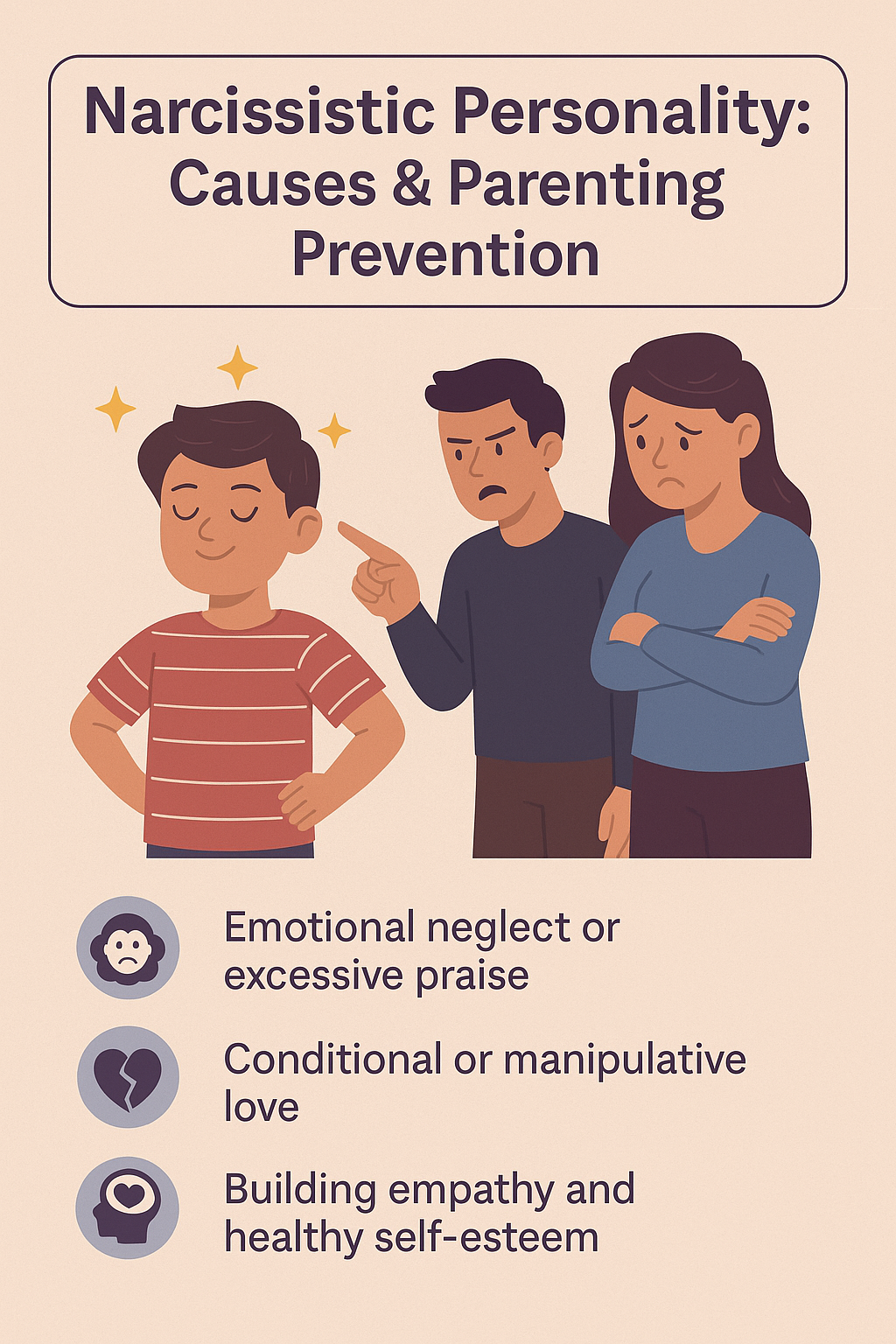
Narcissistic Personality: 7 Powerful Truths About Its Toxic Roots and How to Prevent It in Children
Introduction: What is Narcissistic Personality Disorder?
Narcissistic Personality Disorder (NPD) is a psychological condition characterized by an inflated sense of self-importance, a deep need for excessive attention and admiration, troubled relationships, and a lack of empathy for others. While narcissism exists on a spectrum, when it becomes pervasive and rigid, it can interfere with relationships and emotional well-being.
Many people wonder: how does a person develop narcissistic traits? What early-life factors contribute to it? And most importantly, how can parenting play a role in preventing narcissistic personality development in children?
The Psychological Roots of Narcissistic Personality
Understanding the formation of narcissistic personality begins with a look into early psychological development. Narcissistic traits often stem from complex emotional experiences during childhood that shape a person’s worldview, emotional resilience, and self-concept.
- Emotional Neglect or Excessive Praise:
Children who grow up in environments where their emotional needs are consistently ignored or excessively indulged may struggle to form a balanced sense of self-worth. When praise is not aligned with reality or achievements, children may develop a false self-image to maintain approval. - Conditional Love and Validation:
When parents offer love and acceptance only when the child meets certain expectations, children internalize the idea that their value depends on performance or appearance, not on who they truly are. - Lack of Empathy in the Environment:
Children model their behavior on what they see. If empathy, compassion, and emotional intelligence are not demonstrated in their environment, they may fail to develop these crucial traits themselves. - Over-Identification or Enmeshment:
In some cases, a parent may try to live vicariously through their child, placing excessive expectations and pressure. This denies the child autonomy, forcing them to develop a false persona to gain parental approval.
How Narcissism Manifests in Adulthood
The seeds of narcissistic personality planted during childhood grow stronger over time. In adulthood, narcissism may show up as:
- Manipulative behavior in relationships
- Inability to take responsibility for mistakes
- Hyper-sensitivity to criticism
- A constant need to be admired
- Lack of genuine emotional intimacy
These patterns often disrupt marriages, friendships, and work environments, leading to loneliness, burnout, or anxiety.
Conscious Parenting to Prevent Narcissistic Personality
Preventing narcissistic personality development doesn’t mean raising children to be self-effacing. Instead, it involves fostering emotional intelligence, realistic self-esteem, and healthy interpersonal boundaries.
1. Promote Unconditional Love:
Ensure that your child knows they are loved for who they are, not just what they achieve. Children who feel secure in parental love are less likely to seek validation from external sources.
2. Model Empathy and Respect:
Parents must demonstrate how to care for others’ feelings, apologize when wrong, and respect boundaries. Children learn empathy by experiencing it.
3. Encourage Honest Self-Expression:
Children should be allowed to express both positive and negative emotions without judgment. A child who learns to process anger, jealousy, or fear healthily is less likely to suppress emotions and adopt a grandiose self-image.
4. Teach Accountability:
Instead of blaming others for failures, help children understand consequences and learn from mistakes. This teaches humility and personal responsibility.
5. Avoid Excessive Praise or Criticism:
Balance is key. While it’s important to celebrate achievements, it’s equally important to recognize effort, perseverance, and character. Avoid labeling the child as “the best” or “perfect.”
6. Foster a Growth Mindset:
Encourage the belief that skills and intelligence can be developed over time. This mindset makes children more resilient to failure and less likely to depend on external validation.
7. Set Healthy Boundaries:
Teaching your child to respect their own and others’ boundaries is foundational. It curbs entitlement and helps develop mutual respect in relationships.
Warning Signs in Childhood to Watch Out For
Early identification of unhealthy narcissistic tendencies can help in timely intervention. Look out for:
- Persistent need for admiration or special treatment
- Manipulative behavior with peers or siblings
- Inability to accept criticism or setbacks
- Lack of remorse after hurting others
If such patterns persist, professional counseling can help the child and family navigate these challenges constructively.
Importance of Mental Health Intervention
Early therapeutic support can make a significant difference. Play therapy, family counseling, and cognitive behavioral therapy (CBT) can guide children in developing a more integrated and empathetic personality.
Parents who may themselves have unresolved emotional issues or narcissistic traits can benefit from therapy to prevent the transmission of unhealthy patterns to the next generation.
Conclusion: Raising Emotionally Healthy Children
Narcissistic personality development isn’t a result of one parenting mistake but an accumulation of emotional experiences over time. By practicing conscious parenting—grounded in love, empathy, boundaries, and emotional intelligence—parents can raise children with a healthy sense of self and deep respect for others.
Preventing narcissistic traits begins at home. When children feel seen, heard, and valued for who they truly are, they grow into compassionate, self-aware adults capable of building meaningful connections.
SEO Focus Keyword: narcissistic personality

